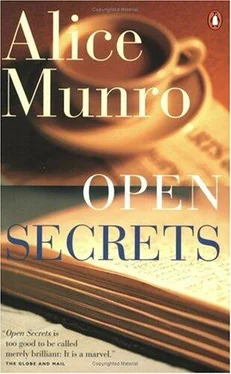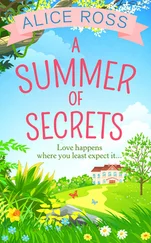(For example, what Frances was saying about Heather Bell’s mother, and what she said about Mary Johnstone and the hike in general. Frances thought she was an authority on that, because Mary Kaye Trevelyan was her granddaughter.)
Mary Johnstone was a woman you were hardly supposed to mention in Carstairs without attaching the word “wonderful.” She had had polio and nearly died of it, at the age of thirteen or fourteen. She was left with short legs, a short, thick body, crooked shoulders, and a slightly twisted neck, which kept her big head a little tilted to one side. She had studied bookkeeping, she had got herself a job in the office at Douds Factory, and she had devoted her spare time to girls, often saying that she had never met a bad one, just some who were confused. Whenever Maureen met Mary Johnstone on the street or in a store, her heart sank. First came that searching smile, the eyes raking yours, the declared delight in any weather — wind or hail or sun or rain, each had something to recommend it — then the laughing question. So what have you been up to, Mrs. Stephens? Mary Johnstone always made a point of saying “Mrs. Stephens,” but she said it as if it was a play title and she was thinking all the time, It’s only Maureen Coulter. (Coulters were just like the Trowells that Frances had remarked on — country. No more, no less.) What interesting things have you been doing lately, Mrs. Stephens?
Maureen felt then as if she was being put on the spot and could do nothing about it, as if a challenge was being issued, and it had something to do with her lucky marriage and her tall healthy body, whose only misfortune was a hidden one — her tubes had been tied to make her infertile — and her rosy skin and auburn hair, and the clothes she spent a lot of money and time on. As if she must owe Mary Johnstone something, a never specified compensation. Or as if Mary Johnstone could see more lacking than Maureen herself would face.
Frances didn’t care for Mary Johnstone, either, in the pure and simple way she didn’t care for anybody who made too much of themselves.
Miss Johnstone had taken them on a half-mile hike before breakfast, as she always did, to climb the Rock — the chunk of limestone that jutted out over the Peregrine River, and was so rare a thing in that part of the country that it was not named anything but the Rock. On Sunday morning you always had to do that hike, dopey as you were from trying to stay awake all night and half sick from smoking smuggled cigarettes. Shivering, too, because the sun wouldn’t have reached deep into the woods yet. The path hardly deserved to be called one — you had to climb over rotted tree trunks and wade through ferns and what Miss Johnstone pointed out as Mayapples and wild geraniums, and wild ginger. She would pull it up and nibble it, hardly brushing off the dirt. Look what nature provides us.
I forgot my sweater, Heather said when they were halfway up. Can I go back and get it?
In the old days Miss Johnstone would probably have said no. Get a move on and you’ll warm up without it, she would have said. She must have felt uneasy this time, because of the waning popularity of her hikes, which she blamed on television, working mothers, laxity in the home. She said yes.
Yes, but hurry. Hurry and catch up.
Which Heather Bell never did do. At the Rock they looked at the view (Maureen recalled looking around for French safes — did they still call them that? — among the beer bottles and candy wrappers), and Heather had not caught up. On the way back they didn’t meet her. She wasn’t in the big tent, or in the little tent, where Miss Johnstone had slept, or between the tents. She wasn’t in any of the shelters or love nests among the cedars surrounding the campground. Miss Johnstone cut that searching short.
“Pancakes,” she called. “Pancakes and coffee! See if the smell of pancakes and coffee won’t smoke Miss Mischief out of hiding.”
They had to sit and eat — after Miss Johnstone had said grace, thanking God for everything in the woods and at home — and as they ate, Miss Johnstone called out, “Yum-my!
“Doesn’t the fresh air give us an appetite?” she said at the top of her voice. “Aren’t these the best pancakes you ever did eat? Heather better hurry up or there won’t be one left. Heather? Are you listening? Not one left!”
As soon as they were finished, Robin Sands asked if they could go now, could they go and look for Heather?
“Dishes first, my lady,” Miss Johnstone said. “Even if you never do pick up a dishrag around home.”
Robin nearly burst out crying. Nobody ever spoke to her like that.
After they had cleaned up, Miss Johnstone let them go, and that was when they went back to the Falls. But she brought them back soon enough and made them sit in a semicircle, wet as they were, and she herself sat cross-legged in front of them and called out that anybody listening was welcome to come and join them. “Anybody hiding round here and trying to play tricks is welcome! Come out now and no questions asked! Otherwise we will just have to get along without you!”
Then she launched into her talk, her Sunday-morning-of-the-hike sermon, without any qualms or worries. She kept going and going, asking a question every now and then, to make sure they were listening. The sun dried their shorts and Heather Bell did not come back. She did not appear out of the trees and still Miss Johnstone did not stop talking. She didn’t let go of them until Mr. Trowell drove into the camp in his truck, bringing the ice cream for lunch.
She didn’t give them permission then, but they broke loose anyway. They jumped up and ran for the truck. They all started telling him at once. Jupiter, the Trowell’s dog, jumped over the tailgate, and Eva Trowell threw her arms about him and started to wail as if he had been the one lost.
Miss Johnstone got to her feet and came over and called out to Mr. Trowell above the girls’ clamoring.
“One’s taken it into her head to go missing!”
Now the search parties were out. Douds was closed, so that every man who wanted to go could go. Dogs had been added. There was talk of dragging the river downstream from the Falls.
When the constable went to tell Heather Bell’s mother, he found her just back from her own weekend, wearing a backless sundress and high heels.
“Well, you better find her,” she said. “That’s your job.”
She worked at the hospital — she was a nurse. “Either divorced or never was married in the first place,” Frances said. “One for all and all for one, that’s her.”
Maureen’s husband was calling her, and she hurried away to the sunroom. After his stroke two years ago, at the age of sixty-nine, he had given up his law practice, but he still had letters to write and a bit of business to do for old clients who could never get used to anybody else. Maureen typed out all his correspondence and helped him every day with what he called his chores.
“Whaur doing out there?” he said. His speech was sometimes slurred, so she had to stay around and interpret for people who did not know him well. Alone with her he made less effort, and his tone could be testy and complaining.
“Talking to Frances,” said Maureen.
“Wha’ bout?”
“This and that,” she said.
“Yeah.”
He stretched out the word gloomily, as if to say he well knew what their talk had been about and he did not care for it. Gossip, rumor, the coldhearted thrill of catastrophe. He never went in for much talk, now or in the days when he could talk readily — even his reproofs were brief, a matter of tone and implication. He seemed to call upon a body of belief, on rules known to all decent people and maybe to all people, even those who spent their lives falling short. He seemed to be a little pained, a little embarrassed for all concerned, when he had to do this, and at the same time formidable. His reproofs were extraordinarily effective.
Читать дальше












